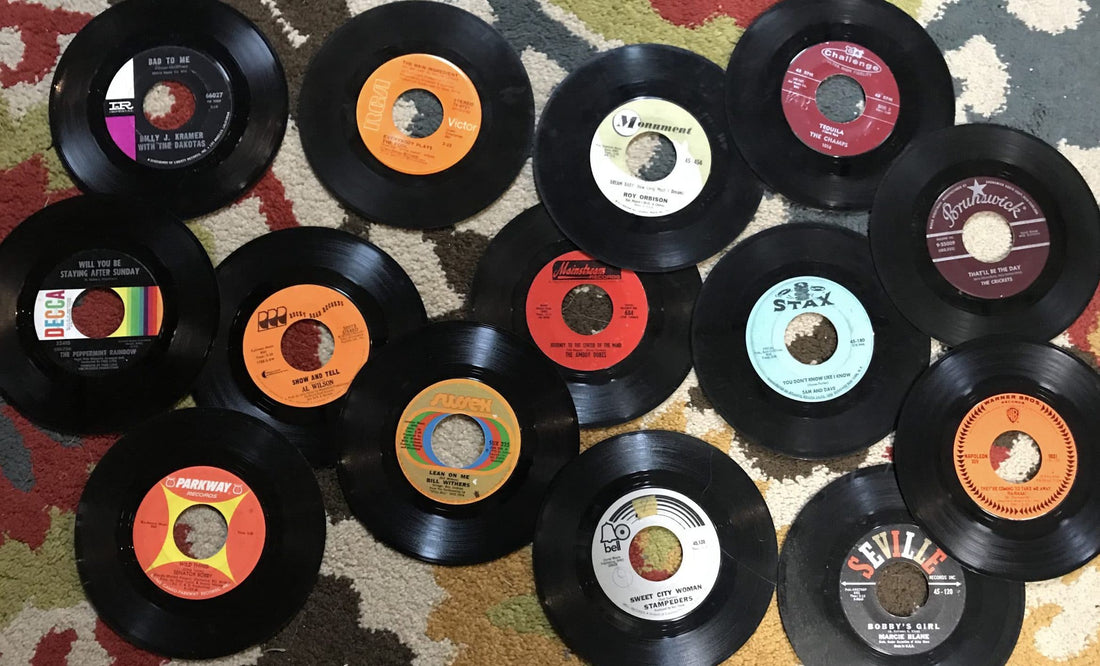Irving Bieler was one step away from joining the Swinging Sixties.
He was standing in front of the Music Box on South Main Street in Fall River, Massachusetts. He had no idea what he was going to find inside. He was 37, a husband, a father of three, and a World War II veteran. It was 1964 and the world was changing in ways that this child of the Great Depression could not understand. Young men and women were saying and doing things it had never occurred to him to say or do.
But his oldest son, who was nine, had watched the Beatles on The Ed Sullivan Show and had been lobbying for music. Not the radio, not the television. His son wanted records.
This was another new thing. Irving had never had records to play or something to play them on. Music for him was whatever random songs came on the radio. But he was determined to give his children all the things he had never had. If his son wanted records, his son was going to get records. Period. Irving took a breath, put on his brightest smile, and pushed open the door.
He saw long lines of boxes holding records in paper and cardboard sleeves. There were labels everywhere for different artists, but Irving didn’t recognize the names. His musical tastes ran in narrow grooves: Hank Williams and novelty numbers such as Sheb Wooley’s “The Purple People Eater” and the Hollywood Argyles’ “Alley-Oop.”

The woman running the shop had long hair, but something about her made him nervous. He spotted two teenage girls in one aisle. Irving liked talking with new people, and they looked friendly. He approached them and said, “Could you girls help me? I’m looking for records for my children but I’m not sure what to look for.”
The girls considered this. “How old are your kids?” one of them asked. “What kind of music do they like?”
“The two oldest are nine and six. My daughter is a baby.” Irving resisted the urge to pull out the baby pictures. “We saw the Beatles when they were on Ed Sullivan. My oldest likes that kind of music, so maybe the Beatles and bands like them. Also The Mickey Mouse Club. And Alvin and the Chipmunks. But mostly the Beatles. And they have to be those small records, not the albums. The 45s.”
The girls took Irving on a whirlwind tour of popular music. After much consultation between them, none of which Irving understood, they handed him a dozen records. Irving, dazed, walked to the counter and got the attention of the long-haired woman, who, he was shocked to see, was actually a man. He wasn’t a beatnik, but what was he with all that hair?
You spin me right round, baby, right round
Irving chose 45s because the only record player the family had was a machine that played 45s. He liked it because it was a solid brown box the size of a birthday cake with a speaker inside and a thick plastic pipe sticking up out of it. You fit the hole in the middle of your record over the pipe and plopped it down onto the turntable, and then you swung the arm over and clamped the tone arm firmly to the record. You clicked the Play lever and the record rotated while the needle mounted inside the tone arm plowed miniature furrows around the vinyl.
The kids couldn’t knock this thing over. Irving had come to prefer furniture and other objects that the kids couldn’t knock over, break, or chew.
When Irving brought this new music home, his nine-year-old son was thrilled. Until this point in his musical experience, all he had had to play were the records his younger aunts had abandoned in the attic of the old family house and that Irving had rescued. Things like Carmen Cavallaro playing “Chopsticks” from some movie that was too boring for a nine-year-old to watch, Don Robertson’s “The Happy Whistler” (of interest only to people who are new to whistling), and Manos Hatzidakis’ “Never on Sunday,” which his mom, Gloria, sang while she washed the dishes.
Suddenly, the little boy had music from his own century, not from the dusty old one the grown-ups lived in. Records like these:
The Beatles, “She Loves You,” “Please Please Me,” “Twist and Shout,” “There’s a Place”
The Animals, “House of the Rising Sun”
The Dave Clark Five, “Glad All Over”
The Supremes, “Where Did Our Love Go?”
The Rooftop Singers, “Walk Right In”
Gloria was not happy when the music began to play. Neither was Irving. In fact, for the next 15 years, one of his most-used expressions was “Turn that down!” or, when truly distressed by the Who or Jimi Hendrix, he reverted to the fractured English of his parents and yelled “Make it stiller!” And yet he eventually replaced the indestructible old record player with a stereo console nestled in a deep box of fake wood. It was a big upgrade in sound quality, even after one of the speakers died.
I am the nine-year-old boy who grew up to be me, and I am writing this in loving memory of my father on the first anniversary of his death at age 92. Thank you, Dad, for venturing into that store, even if it meant dealing with a man with long hair. And thank you, girls, for understanding that a boy of nine would eventually grow into a song like “House of the Rising Sun.”




